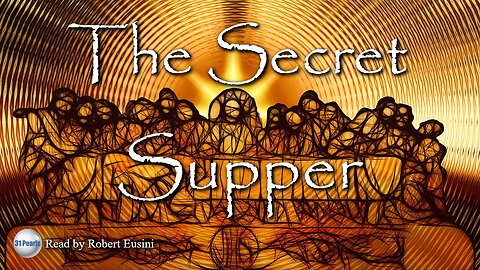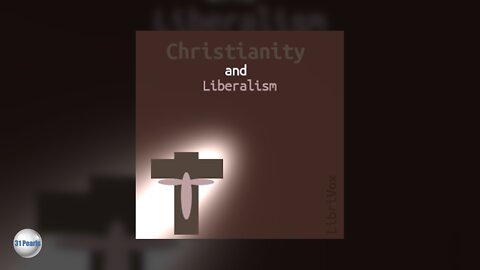-
The Secret Supper of John The Apostle
 31 PearlsThe Secret Supper is a Bogomil apocryphal text from Bulgaria. It is the discourse between John The Apostle and The Lord at a secret supper. Bogomilism was a Christian Neo-Gnostic sect founded in the first Bulgarian Empire by the priest Bogomil, during the reign of Czar Peter the 1st in the 10th century. Video produced by 31 Pearls, all rights reserved. This video and/or audio may not be copied or reproduced in part or in whole. ℗31Pearls102 views
31 PearlsThe Secret Supper is a Bogomil apocryphal text from Bulgaria. It is the discourse between John The Apostle and The Lord at a secret supper. Bogomilism was a Christian Neo-Gnostic sect founded in the first Bulgarian Empire by the priest Bogomil, during the reign of Czar Peter the 1st in the 10th century. Video produced by 31 Pearls, all rights reserved. This video and/or audio may not be copied or reproduced in part or in whole. ℗31Pearls102 views -
Audiobook - Demonstration of the Apostolic Preaching by Irenaeus - Section 1
 31 PearlsSection 1: The Demonstration of the Apostolic Preaching by Irenaeus. Translated by Armitage Robinson (1858 - 1933). Read by InTheDesert. Edited by 31 Pearls. Summary from preface: Eusebius in his Ecclesiastical History tells us that in addition to his great work Against Heresies, St Irenaeus wrote A Discourse in Demonstration of the Apostolic Preaching. This work was entirely lost sight of: no one seems ever to have quoted a word of it. But it has quite recently reappeared in an Armenian manuscript together with Books IV and V of the greater work. The Armenian translation proves to be a fairly close rendering of the original Greek… What Irenaeus undertakes in the present work is to set out the main points of this Apostolic message, which, as he has explained in his greater work, has been handed down in the Church by the successions of the bishops and is the same in substance in all parts of the world, and to demonstrate its truth more especially from the sacred scriptures of the Old Testament. Who was Irenaeus? Irenaeus (/ɪrɪˈneɪəs/; Greek: Εἰρηναῖος Eirēnaios; c. 130 – c. 202 AD)[3] was a Greek bishop noted for his role in guiding and expanding Christian communities in the southern regions of present-day France and, more widely, for the development of Christian theology by combating heresy and defining Catholic orthodoxy. Originating from Smyrna, he had seen and heard the preaching of Polycarp,[4] who in turn was said to have heard John the Evangelist,[5] and thus was the last-known living connection with the Apostles. - Wikipedia. Video produced by 31 Pearls, all rights reserved. Video produced by 31 Pearls. Thank you for watching!116 views
31 PearlsSection 1: The Demonstration of the Apostolic Preaching by Irenaeus. Translated by Armitage Robinson (1858 - 1933). Read by InTheDesert. Edited by 31 Pearls. Summary from preface: Eusebius in his Ecclesiastical History tells us that in addition to his great work Against Heresies, St Irenaeus wrote A Discourse in Demonstration of the Apostolic Preaching. This work was entirely lost sight of: no one seems ever to have quoted a word of it. But it has quite recently reappeared in an Armenian manuscript together with Books IV and V of the greater work. The Armenian translation proves to be a fairly close rendering of the original Greek… What Irenaeus undertakes in the present work is to set out the main points of this Apostolic message, which, as he has explained in his greater work, has been handed down in the Church by the successions of the bishops and is the same in substance in all parts of the world, and to demonstrate its truth more especially from the sacred scriptures of the Old Testament. Who was Irenaeus? Irenaeus (/ɪrɪˈneɪəs/; Greek: Εἰρηναῖος Eirēnaios; c. 130 – c. 202 AD)[3] was a Greek bishop noted for his role in guiding and expanding Christian communities in the southern regions of present-day France and, more widely, for the development of Christian theology by combating heresy and defining Catholic orthodoxy. Originating from Smyrna, he had seen and heard the preaching of Polycarp,[4] who in turn was said to have heard John the Evangelist,[5] and thus was the last-known living connection with the Apostles. - Wikipedia. Video produced by 31 Pearls, all rights reserved. Video produced by 31 Pearls. Thank you for watching!116 views -
Audiobook - Demonstration of the Apostolic Preaching by Irenaeus - Section 2
 31 PearlsSection 2: The Demonstration of the Apostolic Preaching by Irenaeus. Translated by Armitage Robinson (1858 - 1933). Read by InTheDesert. Edited by 31 Pearls. Summary from preface: Eusebius in his Ecclesiastical History tells us that in addition to his great work Against Heresies, St Irenaeus wrote A Discourse in Demonstration of the Apostolic Preaching. This work was entirely lost sight of: no one seems ever to have quoted a word of it. But it has quite recently reappeared in an Armenian manuscript together with Books IV and V of the greater work. The Armenian translation proves to be a fairly close rendering of the original Greek… What Irenaeus undertakes in the present work is to set out the main points of this Apostolic message, which, as he has explained in his greater work, has been handed down in the Church by the successions of the bishops and is the same in substance in all parts of the world, and to demonstrate its truth more especially from the sacred scriptures of the Old Testament. Who was Irenaeus? Irenaeus (/ɪrɪˈneɪəs/; Greek: Εἰρηναῖος Eirēnaios; c. 130 – c. 202 AD)[3] was a Greek bishop noted for his role in guiding and expanding Christian communities in the southern regions of present-day France and, more widely, for the development of Christian theology by combating heresy and defining Catholic orthodoxy. Originating from Smyrna, he had seen and heard the preaching of Polycarp,[4] who in turn was said to have heard John the Evangelist,[5] and thus was the last-known living connection with the Apostles. - Wikipedia. Video produced by 31 Pearls, all rights reserved. Video produced by 31 Pearls. Thank you for watching!75 views
31 PearlsSection 2: The Demonstration of the Apostolic Preaching by Irenaeus. Translated by Armitage Robinson (1858 - 1933). Read by InTheDesert. Edited by 31 Pearls. Summary from preface: Eusebius in his Ecclesiastical History tells us that in addition to his great work Against Heresies, St Irenaeus wrote A Discourse in Demonstration of the Apostolic Preaching. This work was entirely lost sight of: no one seems ever to have quoted a word of it. But it has quite recently reappeared in an Armenian manuscript together with Books IV and V of the greater work. The Armenian translation proves to be a fairly close rendering of the original Greek… What Irenaeus undertakes in the present work is to set out the main points of this Apostolic message, which, as he has explained in his greater work, has been handed down in the Church by the successions of the bishops and is the same in substance in all parts of the world, and to demonstrate its truth more especially from the sacred scriptures of the Old Testament. Who was Irenaeus? Irenaeus (/ɪrɪˈneɪəs/; Greek: Εἰρηναῖος Eirēnaios; c. 130 – c. 202 AD)[3] was a Greek bishop noted for his role in guiding and expanding Christian communities in the southern regions of present-day France and, more widely, for the development of Christian theology by combating heresy and defining Catholic orthodoxy. Originating from Smyrna, he had seen and heard the preaching of Polycarp,[4] who in turn was said to have heard John the Evangelist,[5] and thus was the last-known living connection with the Apostles. - Wikipedia. Video produced by 31 Pearls, all rights reserved. Video produced by 31 Pearls. Thank you for watching!75 views -
Christianity and Liberalism
 31 PearlsChristianity and Liberalism by John Gresham Machen (1881 - 1937). Chapter 1 - 00:00:00 - Introduction Chapter 2 - 00:25:49 - Doctrine Chapter 3 - 01:28:44 - God and Man Chapter 4 - 01:54:18 - The Bible Chapter 5 - 02:12:08 - Christ Chapter 6 - 03:16:14 - Salvation Chapter 7 - 04:24:10 - The Church The purpose of this book is not to decide the religious issue of the present day, but merely to present the issue as sharply and clearly as possible, in order that the reader may be aided in deciding it for himself...In the sphere of religion, in particular, the present time is a time of conflict; the great redemptive religion which has always been known as Christianity is battling against a totally diverse type of religious belief, which is only the more destructive of the Christian faith because it makes use of traditional Christian terminology. This modern non-redemptive religion is called “modernism” or “liberalism.”...we shall be interested in showing that despite the liberal use of traditional phraseology, modern liberalism not only is a different religion from Christianity but belongs in a totally different class of religions. - Summary Adapted from Introduction. Read by Libravox volunteer InTheDesert, edited by 31 Pearls. Video produced by 31 Pearls. Thank you for watching!56 views
31 PearlsChristianity and Liberalism by John Gresham Machen (1881 - 1937). Chapter 1 - 00:00:00 - Introduction Chapter 2 - 00:25:49 - Doctrine Chapter 3 - 01:28:44 - God and Man Chapter 4 - 01:54:18 - The Bible Chapter 5 - 02:12:08 - Christ Chapter 6 - 03:16:14 - Salvation Chapter 7 - 04:24:10 - The Church The purpose of this book is not to decide the religious issue of the present day, but merely to present the issue as sharply and clearly as possible, in order that the reader may be aided in deciding it for himself...In the sphere of religion, in particular, the present time is a time of conflict; the great redemptive religion which has always been known as Christianity is battling against a totally diverse type of religious belief, which is only the more destructive of the Christian faith because it makes use of traditional Christian terminology. This modern non-redemptive religion is called “modernism” or “liberalism.”...we shall be interested in showing that despite the liberal use of traditional phraseology, modern liberalism not only is a different religion from Christianity but belongs in a totally different class of religions. - Summary Adapted from Introduction. Read by Libravox volunteer InTheDesert, edited by 31 Pearls. Video produced by 31 Pearls. Thank you for watching!56 views



